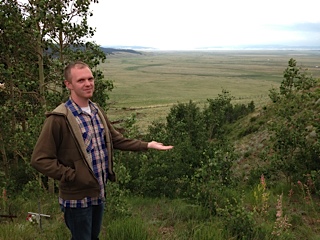The room grows quiet. Sharing a secret about myself can sometimes break the ice, but it doesn’t work too well when I tell people about my brain right off the bat, or when I make it sound as though it might actually tumble out of my head. They stare at me in silence, as though I am a crazy street performer. Despite the silence, I can tell that I have the attention of the incoming volunteers. I’ll be supervising them for a year. “I will fix this,” I think to myself. “This can still be a successful training.” I make my recovery by explaining to the volunteers that I have epilepsy, and that when I have seizures I sometimes make funny sounds and stare at people. I can tell that they are beginning to understand where I am coming from, and that this will be a successful orientation.

Realizing My Epilepsy
Casual conversation regarding epilepsy often begins with “when was your first one?” For me this is slightly difficult to explain. If the person is simply being polite, or if they are in a hurry, I will describe my first tonic clonic seizure. However, when I can tell that they truly wish to know about my situation, I will go into detail about the year leading up to my first seizure.
When I arrived at Michigan State University, I had no idea what I wanted to do with my life. When the Great Recession hit, I quickly realized that I would soon have to pay back my student loan debt, and I knew that it was time to think about my future. Even though I was halfway finished with my education, I still had no idea what that might look like. Unsurprisingly, this caused stress, and I quickly learned that my body did not respond well to stressful topics of conversation. My heart would beat abnormally fast. I would suddenly feel as though the world were going to end. As though I were not worthy of having friends or family. That all the problems in the world were my fault. I would frequently black out, and then wake up lost and confused. Nobody knew what was happening.
Since these episodes didn’t happen regularly, I just figured that I had an emotional problem, and I tried to go about solving my life’s problems. Unfortunately, these problems did not disappear. While at the library studying for a major exam, I would imagine that society was collapsing and wake up sitting on a bench outside. If a best friend was graduating, I suddenly felt like the cheese sticks at her party hated me and that I had no purpose in life. Once, I was speaking to a professor asking for advice and seemed to forget how to speak. Shame and guilt overtook me and I came to stumbling down the hallway.
Then I one night I was driving to a co-worker’s birthday party. While I was on my way, I was singing along to some songs and thinking about what I had to do the following week. Suddenly, I felt as though I were floating above my body. Somehow, I understood my existence. I briefly felt that this was absurd, but I could not refrain from floating on. The next thing that I remember is opening my eyes and seeing a blur. I barely understood anything that was said to me. At one point, a doctor leaned over to explain that I had crashed my car after having a seizure. Luckily, I had no severe physical injuries. A single thought crossed my mind: “So is that what all of those were?”

Accepting My Epilepsy
My epilepsy is the result of a clump of blood vessels in the frontal lobe of my brain that have grown tangled together. The episodes I had been experiencing were actually complex partial seizures, and they seem to often be connected to anxiety or stress. While it was comforting to understand what caused me to lose consciousness, I was told that it could not easily be eradicated. So I would be put on medication and hope that this would work. Sadly, it did not. It is not surprising that I experienced a great deal of stress after crashing my car, losing my license, and experiencing the shock of learning about tangled blood vessels lining my brain. Epilepsy seemed to be a kind of cruel self-fulfilling prophecy.
Through this, however, I was forced to grasp that the human brain is more than a collection of cells. It is how those cells function. Therefore, after much time tolerating failed medications, I decided to see a doctor to discuss the sense that encaptures me before my seizures—a sense known as an aura. By striving for an objective view of myself, I began to see my positive attributes. Even if my brain wasn’t perfect, it was part of me. This not only helped to stop the negative auras that would come along, but it also inspired me to work with neurologists in sorting through a variety of medications in order to find the right treatment for me.
Growing From My Epilepsy
Many people hear about epilepsy and instantly think of it as a disorder to be ashamed of. While it is not something that I brag about while waiting for the bus, it is not something that causes hindrances in my aspirations. It is a part of me. If people are to know me, they should know every part of me.

Epilepsy has also provided me with many opportunities as well. When I was a college student, unsure of my future, epilepsy helped me to focus on all that I should be grateful for. Waking up on streets I do not know, feeling that I should be punished for things outside of my control, and then crashing my car when driving to tell a friend “Happy Birthday”, did a lot. Surviving and expanding from it has done so much more. And that is what I want to provide to others. By having epilepsy I discovered that what I will do with my life is work to give more people the opportunity to feel proud of themselves and to have control over their lives. Others should have similar opportunities. And that is what my training was about. A training for incoming volunteers for nonprofits to assist those in need. Although it is always a challenge to introduce new people to my disorder, I do think the training went quite well.
This story was submitted by Craig Bowers, a Team Leader with AmeriCorps VISTA. Craig is originally from Hillsdale, Michigan, but now lives in Denver, CO. He first began having seizures while he was in college, in November of 2007, and since then he generally has a tonic-clonic seizure every month. We met Craig when he stopped by to say hello at our tent at Strides For Epilepsy at City Park in Denver. Strides is the annual 5k run / walk hosted by the Epilepsy Foundation of Colorado.
